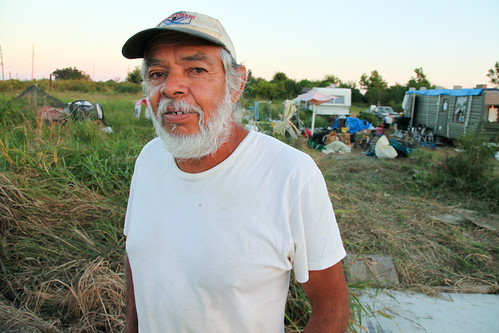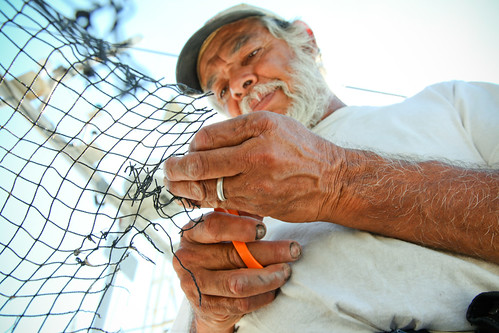A Forgotten Fishermen Fights to Survive the BP Oil Disaster
I first met JJ Creppel last summer while standing in the checkout line of the Buras Dollar Store. It’s one of the few places in this Louisiana fishing town deep down in the bayou where you can buy basic groceries and milk. Nearly all the other stores were destroyed five years ago in the monster storm that roared through here and leveled this community of 5,000 people.
My first impression of JJ was that he’d spent a lifetime at sea, a soft-spoken fisherman with a sun-crinkled face shrouded by a scraggly grey beard. His teeth were crooked but his smile was supreme. He was chatting with the Dollar Store cashier and complaining that BP had ruined his community. I talked to him a while and we exchanged numbers, promising to talk further about the oil then gushing uncontrollably from the blown-out BP well a mile below the Gulf.
But it was months before I heard back from him. Just a few days after our brief encounter, JJ says he had a heart attack. The stress of watching TV and the video of black and brown crude spewing from the well was just too much to bear. JJ says he spent a week in the hospital and could do little when he got back to his small, leaky trailer home, planted in a grassy field close to a fish oil processing plant that blows skunk–like odors over the marshy area.
Listen to JJ Creppel talk about the devastating impact of the BP oil disaster on his life and his fishing community in the video slideshow below, the latest installment in a partnership between StoryCorps, NRDC and Bridge the Gulf – “Stories from the Gulf: Living with the BP oil disaster.”
JJ is a proud Native American who grew up in this once-thriving community. He’s a member of the United Houma Nation, part of a Native American heritage that fished and hunted here long before Europeans claimed this land and water for their own. Like many, he’s had a rough time since Katrina. Then the BP oil disaster this year delivered a near knockout punch.
But JJ survived. And about 6 weeks ago, he called me to tell me a friend had found a nest of baby alligators smothered in oil. He warned me that lots of birds and animals were dead from this oil spill, buried deep in the marsh and eaten by predators before anyone could find them. And he wanted to show me.
There was just one problem. He didn’t have a boat. It had been destroyed by Katrina, and another boat he used was broken. He was trying to get some money together to get another one. He promised we’d go out once he got one.
But that hasn’t happened yet. Instead, JJ, his fiancée and occasionally a grandchild or two, live in his small trailer home, surrounded by weeds, torn fishing nets and a few chickens and goats. JJ is attached to his animals, calling them by presidential names; Ronald Reagan, George Bush, even Jimmy Carter. He's not particularly partisan after all.

Photo by Lisa Whiteman/NRDC
JJ is a survivor in this hard scrabble fishing community, where fistfights are a normal way of settling scores. In good times before the oil catastrophe and Katrina, he says he could make thousands of dollars a night shrimping. Now he doesn’t have enough money for gas.
This week, his truck was almost repossessed until Catholic Charities intervened and paid off his loan. But JJ says they can’t give him the gas cards or food vouchers he desperately needs. JJ still has not received his six-month emergency claim from BP, something he says has been mired in a paperwork snafu he’s not sure will ever be fixed.
JJ says he knows lots of people in the same shape down here in the bayou, people who’ve made a living off the land and now find themselves flat on their backs. Food and gas is scarce, he says, and some don’t have the means to travel 20 miles up the road to weekly food banks in the small Plaquemines Parish fishing community of Port Sulphur. The food banks don’t usually travel as far down as Buras and Venice, towns hit hard by the BP oil disaster.
The truth is, people like JJ are forgotten victims of this oil calamity. They are residents who have lived here for generations, struggling to survive the horrific storms that race across the bayou from time to time. They are used to surviving these, but this BP oil disaster is different. Some here are able to go on with their lives, but many cannot. Their fishing world has been upended, some suspect forever.
.
Photo by Lisa Whiteman/NRDC
JJ hopes he can still make it. He’s planning to start a chicken farm to make ends meet. BP turned him from a fisherman into a farmer, he says. But JJ will remain in the Louisiana bayou, a natural jewel of earth that is the only world he knows. He took his first breath here, and he vows that here he will take his last.
Yesterday, JJ told me he had a dream. He dreamed fishermen up in Maine and New England heard about his problems and decided to help. Together they built a boat and brought it down to the bayou just so he could get back on the water.
And with this boat, JJ says, we’ll go out shrimping together in places where the oil has not yet reached. It’s a boat ride that’s long overdue.
